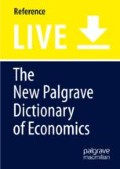Abstract
Contemporary experimental economics was born in the 1950s from the combination of the experimental method used in psychology and new developments in economic theory. Early experimental studies of bargaining behaviour, social dilemmas, individual decision making and market institutions were followed by a long period of underground growth, until the booming of the field in the 1980s and 1990s.
This chapter was originally published in The New Palgrave Dictionary of Economics, 2nd edition, 2008. Edited by Steven N. Durlauf and Lawrence E. Blume
Bibliography
Allais, M. 1953. La psychologie de l’homme rationnel devant le risque: critique des postulats et axiomes de l’école Américaine. Econometrica 21: 503–546.
Allais, M., and O. Hagen (eds.). 1979. Expected utility hypothesis and the allais paradox. Dordrecht: Reidel.
Chamberlin, E.H. 1948. An experimental imperfect market. Journal of Political Economy 56: 95–108.
Davidson, D., P. Suppes, and S. Siegel. 1957. Decision making: An experimental approach. Stanford: Stanford University Press.
Grether, D., and C. Plott. 1979. Economic theory of choice and the preference reversal phenomenon. American Economic Review 69: 623–638.
Guala, F. 2005. The methodology of experimental economics. New York: Cambridge University Press.
Güth, W., R. Schmittberger, and B. Schwartz. 1982. An experimental analysis of ultimatum bargaining. Journal of Economic Behavior and Organization 3: 363–388.
Isaac, R., K. McCue, and C. Plott. 1985. Public goods provision in an experimental environment. Journal of Public Economics 26: 51–74.
Jallais, S., and P. Pradier. 2005. The Allais paradox and its immediate consequences for expected utility theory. In The experiment in the history of economics, ed. P. Fontaine and R. Leonard. London: Routledge.
Lee, K. 2004. Rationality, minds, and machines in the laboratory: a thematic history of Vernon Smith’s experimental economics. PhD thesis, University of Notre Dame.
Leonard, R. 1994. Laboratory strife: Higgling as experimental science in economics and social psychology. In Higgling, ed. N. De Marchi and M. Morgan. Durham, NC: Duke University Press.
Lichtenstein, S., and P. Slovic. 1971. Reversals of preference between bids and choices in gambling decisions. Journal of Experimental Psychology 89: 46–55.
Mill, J.S. 1836. On the definition of political economy and the method of investigation proper to it. In Collected works of John Stuart Mill, vol. 4. Toronto: University of Toronto Press. 1967.
Morgan, M. 2003. Economics. In The Cambridge history of science, volume 7: The modern social sciences, ed. T. Porter and D. Ross. Cambridge: Cambridge University Press.
von Neumann, J., and O. Morgenstern. 1947. The theory of games and economic behavior, 2nd ed. Princeton: Princeton University Press. 1944.
Roth, A. 1995. Introduction to experimental economics. In The handbook of experimental economics, ed. J. Kagel and A. Roth. Princeton: Princeton University Press.
Roth, A. 2002. The economist as engineer: Game theory, experimentation, and computation as tools for design economics. Econometrica 70: 1341–1378.
Roth, A., and M. Malouf. 1979. Game-theoretic models and the role of information in bargaining. Psychological Review 86: 574–594.
Schelling, T. 1960. The strategy of conflict. Cambridge, MA: Harvard University Press.
Selten, R. 1995. Autobiography. In Les prix Nobel/The Nobel prizes 1994. Stockholm: Nobel Foundation.
Shubik, M. 1960. Bibliography on simulation, gaming, artificial intelligence and allied topics. Journal of the American Statistical Association 55: 736–751.
Siegel, S., and L. Fouraker. 1960. Bargaining and group decision making. New York: McGraw-Hill.
Smith, V. 1962. An experimental study of competitive market behavior. Journal of Political Economy 70: 111–137.
Smith, V. 1976. Experimental economics: Induced value theory. American Economic Review 66: 274–277.
Smith, V. 1981. Experimental economics at Purdue. In Papers in experimental economics. Cambridge: Cambridge University Press.
Smith, V. 1982. Microeconomic systems as an experimental science. American Economic Review 72: 923–955.
Smith, V. 1992. Game theory and experimental economics: Beginnings and early influences. In Towards a history of game theory, ed. E. Weintraub. Durham, NC: Duke University Press.
Thrall, R., C. Coombs, and R. Davis (eds.). 1954. Decision processes. New York: Wiley.
Tversky, A., and D. Kahneman. 1974. Judgment under uncertainty: Heuristics and biases. Science 185: 1124–1130.
Author information
Authors and Affiliations
Editor information
Editors and Affiliations
Copyright information
© 2008 The Author(s)
About this entry
Cite this entry
Guala, F. (2008). Experimental Economics, History of. In: The New Palgrave Dictionary of Economics. Palgrave Macmillan, London. https://doi.org/10.1057/978-1-349-95121-5_2184-1
Download citation
DOI: https://doi.org/10.1057/978-1-349-95121-5_2184-1
Received:
Accepted:
Published:
Publisher Name: Palgrave Macmillan, London
Online ISBN: 978-1-349-95121-5
eBook Packages: Springer Reference Economics and FinanceReference Module Humanities and Social SciencesReference Module Business, Economics and Social Sciences

